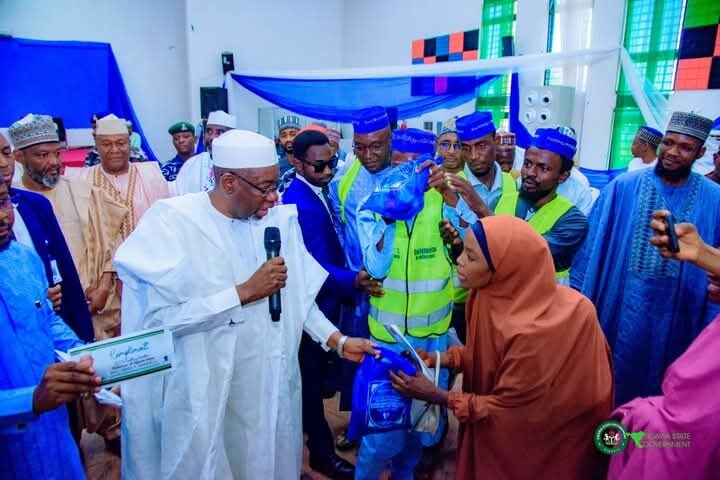Empowering people through entrepreneurship and business of their choice has been a key policy of Governor Malam Umar Namadi’s administration since he took office two years ago. This policy is designed to boost productivity, create jobs, and poverty alleviation.
Earlier this month, the government flagged off the distribution of empowerment grants to over 1,400 women, primarily cap makers.
These cap makers join thousands of Jigawa women who have previously received empowerment grants from federal, state, and local governments. in line with President Bola Ahmed Tinubu’s “Renewed Hope” agenda and Governor Namadi’s 12-point agenda, both of which aim to make Jigawa state prosperous.
The cap is an integral part of male attire in Northern Nigeria; it is rare to see a respected man in traditional dress without cap.
Consequently, the demand and market for caps are as vast as the population of boys and men who wear them.
An average man owns more than five different caps, while some young men have dozens of designs to match various outfits.
Empowering cap makers is a strategic decision, especially since the primary beneficiaries are women. Women’s empowerment is crucial for family well-being and achieving economic inclusivity.
The craft follows a distinct pattern: caps are made by women, sold by men, and worn by men, particularly the popular “Zanna Yarshuwarini” model.
There are many types of caps knitted by women in Jigawa State, with the Zanna model being the most popular, especially in the Dutse Emirates.
The knitting pattern is popularly called “Yarshuwarin ” named after one of the major markets where cap dealers from within and outside the state source their products from individual makers and local dealers.
Thousands of girls and women are engaged in this business, alongside men who act as the major dealers and are the final consumers.
According to Khadija Ibrahim Galadanci from Dutse, there are over 1,000 different designs of the Zanna cap, and passionate designers regularly introduce new innovations to keep up with modern trends.
Speaking at the flag-off ceremony for the distribution of the grant held at the Banquet Hall in Dutse, Governor Malam Umar Namadi stated that the program is part of his administration’s policy to empower citizens through their existing businesses.
The Governor explained that since many women and young girls in the Dutse Emirate area are engaged in cap making, the government decided to support them in improving their businesses for wealth creation and poverty eradication.
“These women and girls engaged in the cap-making business contribute to the micro-economy. They are doing a great deal to promote the welfare and general well-being of their families,” Governor Namadi said.
“Today, we have gathered here to mark another milestone in our quest to fight poverty and empower women to be self-reliant for the growth and sustainable development of our state.”
According to the governor, the grant includes basic materials needed for cap making. He expressed optimism that the intervention will build the women’s capacity to increase production, leading to higher profits and incomes.
“Our plan is to create two production clusters where women can work. When a woman finishes knitting her cap, she will bring it to the cluster center. From there, we will create markets for them—not only within Jigawa State but also beyond Nigeria’s shores,” the Governor stated.
Cap making is a traditional handicraft tied to African culture that has been handed down for generations. It remains a vital source of livelihood for millions.
In Jigawa State, this embroidery craft has been inherited over generations and plays a significant role in the family economy, as girls and housewives can engage in it and earn an income from their homes.
With this support, a woman who could only produce one or two caps before will now be able to multiply her output. resulting increase in profit and income that will in turn, boost economic productivity in the state.
This empowerment program is hoped to be the beginning of a broader strategy to organize and expand the cap embroidery business into a viable industry, creating more jobs and fostering sustainable development.





